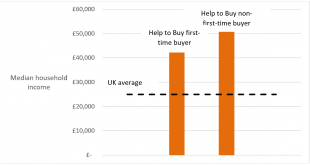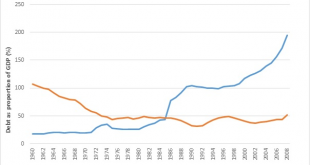We often talk about the housing crisis, and the unaffordability of homes and rent – but we rarely talk about the land beneath our homes, and its role in the crisis. Across the country, a lack of affordable land is stoking the affordability crisis, forcing up the price of homes and rents. Despite this, and under the radar, the government has been pursuing a massive sale of public land – encouraging cash-strapped public authorities to sell their hospitals,...
Read More »“Flattering to deceive” – New Economics Foundation response to PM’s housing pledges
Responding to the Prime Minister’s speech to Conservative Party Conference, Joe Beswick, Housing Lead at the New Economics Foundation, said: “This speech was trailed as the start of a new council housebuilding revolution. Instead, the Prime Minister flattered to deceive. All we got was a bit of extra cash for existing programmes which are failing to deliver the housing people need. “If the Prime Minister were serious about addressing the housing crisis, she would...
Read More »Four reasons why Help to Buy should be scrapped, not extended
Theresa May confirmed yesterday that a whopping £10bn more would be earmarked for Help to Buy. Under this scheme, the government lends buyers of new-build homes a 20% equity loan so that they only need a 75% mortgage and a 5% deposit. May said this huge injection of funding would help the ‘just about managing’. But evidence from the scheme to date suggests that it is more likely to help those on higher incomes than struggling young renters. Here are four reasons...
Read More »Back to the future
This is a guest post by Karel Williams, Professor of Accounting and Political Economy at Alliance Manchester Business School. The views of guest contributors are not necessarily those of the New Economics Foundation. Conference season, autumn 2017, and the commentariat’s gaze is fixed on the novelties: the Tories may not survive as our default party of government if their factionalised party tears itself apart on the terms of Brexit; the Labour opposition...
Read More »Tenant control can help fix our broken housing system
If we learnt anything from the Grenfell tragedy, it was that for too long, social housing tenants’ voices have been ignored. Residents knew the tower was unsafe – but nobody listened to them. Earlier this week we heard from the leader of the Labour Party a real commitment to increasing tenant power. His promise to give social housing tenants a ballot on the decision to regenerate their estate would be an important first step in putting tenants back at the heart of...
Read More »Earth or Mars, the future is all about reusability
We are all caught up in a culture of consuming, using and disposing of things. But these ‘things’ then become waste that clogs up the Earth’s ecosystems. So we ask: what is more logical than creating or harnessing things that we can use again and again? It saves us money in the long term, avoids unnecessary waste and opens up possibilities that we have only dreamed of. So here’s the good news. A tidal power station in the Pentland Firth between mainland Scotland...
Read More »New Economics Foundation calls for ‘Khan’s Cars’ as mutually-owned alternative to Uber
In response to today’s decision by TFL to deny Uber a new license, the New Economics Foundation calls for ‘Khan’s Cars’ as a mutually-owned, publicly-regulated alternative to Uber. Transport for London (TFL) and the Mayor of London have today made a huge intervention in the so-called ‘gig economy.’ The move comes in reaction to Uber’s poor record of responding to concerns regarding passenger safety and security, and will affect thousands of drivers and their...
Read More »How to organise a community housing project
Community-led housing is a way for local communities to address their housing needs by producing their own decent and affordable homes. It is increasingly seen as a viable alternative for those whose housing needs are not met by the mainstream housing market. But how can communities and individuals access community-led housing? Over two evenings tutors and participants will discuss and work through exercises on key elements of community-led housing including:...
Read More »Northern Rock: ten years on
This week marks 10 years since the collapse of Northern Rock. As shockwaves reverberated throughout the banks, our financial system was quickly brought to its knees. One bank’s failure led to an inconceivable financial meltdown. As the severity of the crisis sunk in, then Chancellor Gordon Brown was forced to put together an unprecedented bank bailout package. He also reportedly considered putting troops on the streets due to fears of civil unrest. All the...
Read More »A Fair Fishing Deal
Decades of overfishing in European waters have taken their toll. Four out of every ten fish stocks are outside safe biological limits, producing fewer fish than if we managed them sustainably. But allowing European fish stocks to grow could deliver an additional 2 million tonnes – enough to feed 89 million citizens, support 20,000 more jobs, and generate additional profits of €1bn. The British government has played a role in failing to realise this potential by...
Read More » New Economics Foundation
New Economics Foundation



